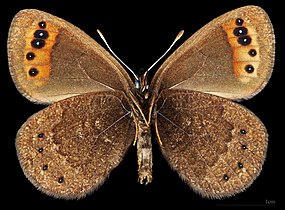de Prunner's ringlet
| de Prunner's ringlet | |
|---|---|

| |
| Erebia triarius | |
| Scientific classification | |
| Domain: | Eukaryota |
| Kingdom: | Animalia |
| Phylum: | Arthropoda |
| Class: | Insecta |
| Order: | Lepidoptera |
| Family: | Nymphalidae |
| Genus: | Erebia |
| Species: | E. triarius |
| Binomial name | |
| Erebia triarius (de Prunner, 1798) | |
The de Prunner's ringlet (Erebia triarius) is a member of the subfamily Satyrinae of the family Nymphalidae.[2]
Distribution
It is a mountain butterfly found in Albania, Andorra, Austria, Switzerland, France, Italy, Spain, Portugal and Yugoslavia.

Description in Seitz
E. evias God. (= bonellii Hbn.) (3.5 g). Always somewhat larger than the preceding [stygne] : the upperside of the wings dark black-brown , the forewing with a russet-red or reddish yellow transverse band bearing 5 white-centred black ocelli of different sizes, 3 of them standing near the costa and being united, while the 2 others stand further back and are somewhat smaller. The band of the hindwing consists of 4-5 oval brown spots, each bearing a white-centred black ocellus. The forewing beneath is similarly marked as above, the hindwing of the male being black, thinly dusted with grey, and bearing a more or less dark median band which is somewhat excurved between the veins. In the lighter discal margin there are 3-5 white-pupilled black ocelli. The female is brownish grey beneath, costal and distal margins of the forewing marmorated with grey and brown like the hindwing, the median band of the latter being more prominent than in the male. — The smaller form from the Pyrenees, pyrenaica Stgr., has the underside more strongly marked, the russet-red band is narrower and the ocelli are absent or strongly reduced. — The form hispanica Zap. (37 a) is somewhat smaller, the transverse band being lighter in both sexes, the ocelli smaller, and the upper 3 ocelli in the band of the forewing moreover are not united as in nymotypical erias, but stand separated one below the other. — The species appears already the middle of May in warmer localities, flying from June to August at higher altitudes, and occurs on grassy slopes; plentiful in most f!ight places. The insect is found in the Pyrenees, the lower Alps of Southern France, in Wallis and the Southern Tyrol.[3]
- Erebia triarius ♂
- Erebia triarius ♂ △
References
- ^ van Swaay, C., Wynhoff, I., Verovnik, R., Wiemers, M., López Munguira, M., Maes, D., Sasic, M., Verstrael, T., Warren, M. & Settele, J. (2010). "Erebia triaria". IUCN Red List of Threatened Species. 2010: e.T173261A6981779. doi:10.2305/IUCN.UK.2010-1.RLTS.T173261A6981779.en. Retrieved 23 January 2024.
{{cite journal}}: CS1 maint: multiple names: authors list (link) - ^ "Erebia Dalman, 1816" at Markku Savela's Lepidoptera and Some Other Life Forms
- ^ Eiffinger, G. in Seitz. A. ed. Band 1: Abt. 1, Die Großschmetterlinge des palaearktischen Faunengebietes, Die palaearktischen Tagfalter, 1909, 379 Seiten, mit 89 kolorierten Tafeln (3470 Figuren)
 This article incorporates text from this source, which is in the public domain.
This article incorporates text from this source, which is in the public domain.
External links
- DNA study "A new conservation unit in the butterfly Erebia triaria (Nymphalidae) as revealed by nuclear and mitochondrial markers", Annales Zoologici Fennici, 2 March 2006



